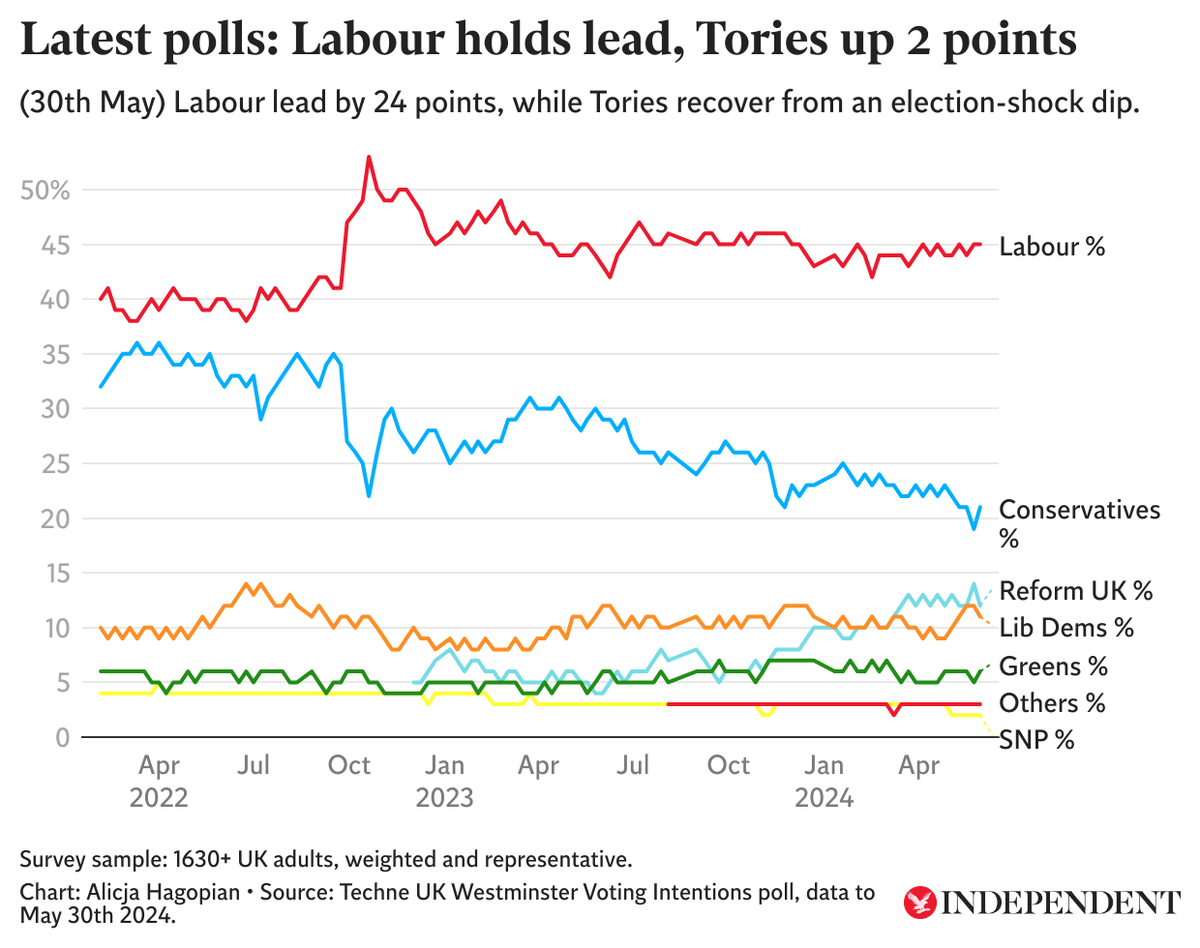
Prime minister Rishi Sunak settled on 4 July for the general election after months of speculation. But while the economic news is good, with inflation coming down, the polls are still heavily against the Tories.
The last general election was in 2019, when Boris Johnson and the Tories won 365 seats, while Jeremy Corbyn’s Labour won 202. Since then, both parties have switched leaders — in some cases, more than once — not to mention Brexit coming into effect and a worldwide Coronavirus pandemic.
So what are the polls saying? If Mr Sunak was hoping to wait for the polls to swing in his favour before calling the election, he was sorely mistaken.
The general public has been overall dissatisfied with both the prime minister and Sir Starmer, with Ipsos polls showing negative net satisfaction consistently for both party leaders since Mr Sunak entered No. 10 in November 2022.
Mr Sunak’s approval rating fell to the ranks of lowest-ever for a prime minister in April, at -59 per cent approval; matched only by John Major in August 1994. This is lower than Liz Truss, whose net approval rating was at -51 per cent for her brief stint as prime minister.
Sir Keir Starmer’s Labour has a 24-point lead in the latest poll on voter intentions from Techne UK, with the Tory-Labour gap remaining as wide as ever.
After a dip in the polls following Mr Sunak’s election announcement, the Tories have made little gains with voters.
At just 20 per cent of the vote, the Conservatives are still at one of their lowest levels of popularity with the electorate under Mr Sunak.
Meanwhile Reform UK have shot up to 15 per cent of the national vote, after being neck-in-neck with the Lib Dems for the past few months, and gunning for the spot of third-highest polling party.
Both parties appear to be picking up support from historical Tory voters.
Labour have polled consistently in the region of 44 per cent and the Conservatives have been shedding more points since January.
Although it is not entirely clear why Mr Sunak chose now to go to the polls, one in four people believe that the prime minister was hoping to benefit from recently improved inflation figures, according to a Redfield and Wilton poll for the Independent.
If that is the case, the Tories have seen no joy when it comes to voter intention.
The latest data is taken from 1,630 surveyed individuals across the UK, weighted to be representative of the population.
Satisfaction with both Mr Sunak and Sir Keir remains poor, according to a separate monthly poll by Ipsos UK.
The data is taken from 1,000 British adults surveyed each month, answering the question: “Are you satisfied/dissatisfied with how ... is doing his job as prime minister/as leader of the Labour Party?”
Despite low figures overall, satisfaction has jumped for the Labour leader in the past month, with a 13-point boost from -31 per cent to -18 per cent.
Mr Sunak saw a 5-point jump in the same period, from -59 per cent to -55 per cent. This puts Mr Starmer at a 37-point lead in net satisfaction.
An exclusive Independent poll from Redfield and Wilton shows that the economy tops the list of issues that are most important to voters, at 37 per cent. With inflation finally slowing down (at 2.3 per cent as of May), the economy could be a key button for the Tories to press; if the general public can look beyond the past two years.
Meanwhile, healthcare is the most important issue for 1 in 5 voters at this election, in the wake of widespread strikes, pandemic strains, and scandals across the NHS including the infected blood inquiry and sky-high waiting lists.
Migration is also a dividing concern among voters, with both Labour and the Tories pledging to cut numbers.







